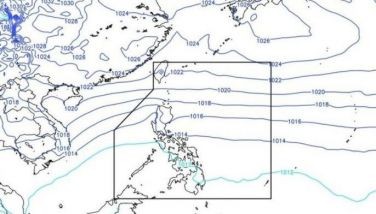RP now a key player in global knowledge network on biotech
January 29, 2007 | 12:00am
LOS BAÑOS, Laguna – A Philippine-based center now forms part of the Global Knowledge Center on Crop Biotechnology, providing vital information on biotechnology to developed and developing countries across the world.
The science-based information network responds to the needs of developing countries on all aspects of crop biotechnology, particularly genetically modified (GM) crops.
It facilitates the flow of information and exchange of experiences on crop biotechnology between and among developed (North) and developing countries (South).
It also promotes public understanding of scientific advances in crop biotechnology and their implications on food, feed and fiber security, and sustainable agriculture.
It involves a network of biotechnology information centers (BICs), among them the Philippine BIC based at the Southeast Asian Ministers of Education Organization-Regional Center for Graduate Study and Research in Agriculture (SEAMEO SEARCA) in Los Baños, Laguna. The Philippine BIC administrator is Sonny Tababa.
Aside from the Philippine BIC, three others are now fully operational – the Thailand BIC based at Kasetsart University in Bangkok; the Malaysia BIC hosted by the Monash University Malaysia in Kuala Lumpur; and AfriCenter in Kenya (Africa), in collaboration with the Africa Biotechnology Stakeholders Forum.
There are also BICs in different stages of development in Indonesia, India, China, Vietnam, Bangladesh, Egypt and Mali.
The information network has strong links in Brazil and Argentina, both in South America. Also within the network are BICs in Russia, Bulgaria, and Pakistan, which are independent nodes funded by their local governments.
The Global Knowledge Center was set up in 2000 by the International Service for the Acquisition of Agri-biotech Applications (ISAAA), a non-profit entity founded in 1991 and co-sponsored by public and private sector institutions.
Currently chaired by its founder, Dr. Clive James, the ISAAA is mandated to facilitate the acquisition and transfer of agricultural biotechnology applications from industrial countries.
Its mission is to contribute to poverty alleviation by increasing crop productivity and income generation, particularly for resource-poor farmers, and to bring about a safer environment and more sustainable agricultural development.
The information network, which has a global mandate, is located at the Los Baños-based ISAAA Southeast Asia Center, currently headed by Dr. Randy Hautea, also the ISAAA global coordinator.
The network is an offshoot of a study tour to Europe and North America in 1999 participated in by six senior policymakers in Southeast Asia.
After the tour, the participants concluded that the dearth of readily available and authoritative information about crop biotechnology, particularly genetically modified crops (soybean, maize, cotton, canola, papaya, squash, and others), was the single most important constraint hindering decision-making regarding GM crops in developing countries where biotechnology could potentially make the most impact on agriculture.
The network’s priority stockholders are BICs, scientists, policymakers, industry, and farmers.
"Through the multiplier effect of communication, the general public is eventually reached," the ISAAA said.
The network’s website CropBiotech Net (www.Isaa.org/kc) provides a broad spectrum of audiences a venue to gain and share knowledge on crop biotechnology through regular updates and science-based information.
Since 2001, the website has had more than a million visitors, Dr. Mariechel Jamias-Navarro, the network’s manager, reported at a recent international conference at the InterContinental Hotel in Makati City.
The highest recorded number of visitors to the site in a month is 50,000. On the average, more than 1,300 visitors access the site every day, Navarro said.
The CropBiotech Update, a weekly electronic summary of global news with implications on developing countries, is fast becoming a popular output. As of December 2006, it had more than 278,000 recipients from 190 countries (144 developing and 46 developed).
In addition, other listserves and websites monitored since mid-2004 have used articles from the Update, hence further increasing the reach of the electronic newsletter by an estimated 30,000 more recipients.
"This is the largest network of its kind, reaching 10 times more subscribers than those of similar services and growing at an average rate of 2,000 subscribers a month," the ISAAA said.
The network produces several publications for various audiences. The most important publication is the Annual Global Review of commercialized transgenic crops published as ISAAA Briefs. Written by Dr. Clive James, ISAAA chairman, these reviews have become the most authoritative single source of information on the status of commercial uses of GM crops globally.
The most recent review has had extensive global exposure through more than 200 media stories in principal newspapers in 21 countries with more than 450 million impressions around the world.
Executive summaries of the ISAAA Briefs are available in 12 languages.
The network documents experiences of various stakeholders (farmers, scientists, private and public sectors) in the development and adoption of technologies.
Now available in video format are documentaries on Bt corn in the Philippines, Bt corn in India, and a tissue culture banana project in East Africa.
An in-depth and comprehensive discussion and analysis of the dynamics of public discourse and decision-making among key stakeholders on agricultural biotechnology in the Philippines and Indonesia has also been completed.
Summing up, the Global Knowledge Center on Crop biotechnology has made significant strides after five years of operation.
"With the rich experiences gained from the implementation of its activities and the feedback generated from its various clients, the (network) has evolved into a more responsive and relevant entity," the ISAAA said.
The science-based information network responds to the needs of developing countries on all aspects of crop biotechnology, particularly genetically modified (GM) crops.
It facilitates the flow of information and exchange of experiences on crop biotechnology between and among developed (North) and developing countries (South).
It also promotes public understanding of scientific advances in crop biotechnology and their implications on food, feed and fiber security, and sustainable agriculture.
It involves a network of biotechnology information centers (BICs), among them the Philippine BIC based at the Southeast Asian Ministers of Education Organization-Regional Center for Graduate Study and Research in Agriculture (SEAMEO SEARCA) in Los Baños, Laguna. The Philippine BIC administrator is Sonny Tababa.
Aside from the Philippine BIC, three others are now fully operational – the Thailand BIC based at Kasetsart University in Bangkok; the Malaysia BIC hosted by the Monash University Malaysia in Kuala Lumpur; and AfriCenter in Kenya (Africa), in collaboration with the Africa Biotechnology Stakeholders Forum.
There are also BICs in different stages of development in Indonesia, India, China, Vietnam, Bangladesh, Egypt and Mali.
The information network has strong links in Brazil and Argentina, both in South America. Also within the network are BICs in Russia, Bulgaria, and Pakistan, which are independent nodes funded by their local governments.
The Global Knowledge Center was set up in 2000 by the International Service for the Acquisition of Agri-biotech Applications (ISAAA), a non-profit entity founded in 1991 and co-sponsored by public and private sector institutions.
Currently chaired by its founder, Dr. Clive James, the ISAAA is mandated to facilitate the acquisition and transfer of agricultural biotechnology applications from industrial countries.
Its mission is to contribute to poverty alleviation by increasing crop productivity and income generation, particularly for resource-poor farmers, and to bring about a safer environment and more sustainable agricultural development.
The information network, which has a global mandate, is located at the Los Baños-based ISAAA Southeast Asia Center, currently headed by Dr. Randy Hautea, also the ISAAA global coordinator.
The network is an offshoot of a study tour to Europe and North America in 1999 participated in by six senior policymakers in Southeast Asia.
After the tour, the participants concluded that the dearth of readily available and authoritative information about crop biotechnology, particularly genetically modified crops (soybean, maize, cotton, canola, papaya, squash, and others), was the single most important constraint hindering decision-making regarding GM crops in developing countries where biotechnology could potentially make the most impact on agriculture.
The network’s priority stockholders are BICs, scientists, policymakers, industry, and farmers.
"Through the multiplier effect of communication, the general public is eventually reached," the ISAAA said.
The network’s website CropBiotech Net (www.Isaa.org/kc) provides a broad spectrum of audiences a venue to gain and share knowledge on crop biotechnology through regular updates and science-based information.
Since 2001, the website has had more than a million visitors, Dr. Mariechel Jamias-Navarro, the network’s manager, reported at a recent international conference at the InterContinental Hotel in Makati City.
The highest recorded number of visitors to the site in a month is 50,000. On the average, more than 1,300 visitors access the site every day, Navarro said.
The CropBiotech Update, a weekly electronic summary of global news with implications on developing countries, is fast becoming a popular output. As of December 2006, it had more than 278,000 recipients from 190 countries (144 developing and 46 developed).
In addition, other listserves and websites monitored since mid-2004 have used articles from the Update, hence further increasing the reach of the electronic newsletter by an estimated 30,000 more recipients.
"This is the largest network of its kind, reaching 10 times more subscribers than those of similar services and growing at an average rate of 2,000 subscribers a month," the ISAAA said.
The network produces several publications for various audiences. The most important publication is the Annual Global Review of commercialized transgenic crops published as ISAAA Briefs. Written by Dr. Clive James, ISAAA chairman, these reviews have become the most authoritative single source of information on the status of commercial uses of GM crops globally.
The most recent review has had extensive global exposure through more than 200 media stories in principal newspapers in 21 countries with more than 450 million impressions around the world.
Executive summaries of the ISAAA Briefs are available in 12 languages.
The network documents experiences of various stakeholders (farmers, scientists, private and public sectors) in the development and adoption of technologies.
Now available in video format are documentaries on Bt corn in the Philippines, Bt corn in India, and a tissue culture banana project in East Africa.
An in-depth and comprehensive discussion and analysis of the dynamics of public discourse and decision-making among key stakeholders on agricultural biotechnology in the Philippines and Indonesia has also been completed.
Summing up, the Global Knowledge Center on Crop biotechnology has made significant strides after five years of operation.
"With the rich experiences gained from the implementation of its activities and the feedback generated from its various clients, the (network) has evolved into a more responsive and relevant entity," the ISAAA said.
BrandSpace Articles
<
>
- Latest
Latest
Latest
November 11, 2024 - 1:43pm
By EC Toledo | November 11, 2024 - 1:43pm
November 6, 2024 - 7:16pm
November 6, 2024 - 7:16pm
November 6, 2024 - 4:50pm
November 6, 2024 - 4:50pm
November 4, 2024 - 9:12am
November 4, 2024 - 9:12am
November 1, 2024 - 9:00am
By Aian Guanzon | November 1, 2024 - 9:00am
October 31, 2024 - 12:02pm
October 31, 2024 - 12:02pm
Recommended






























